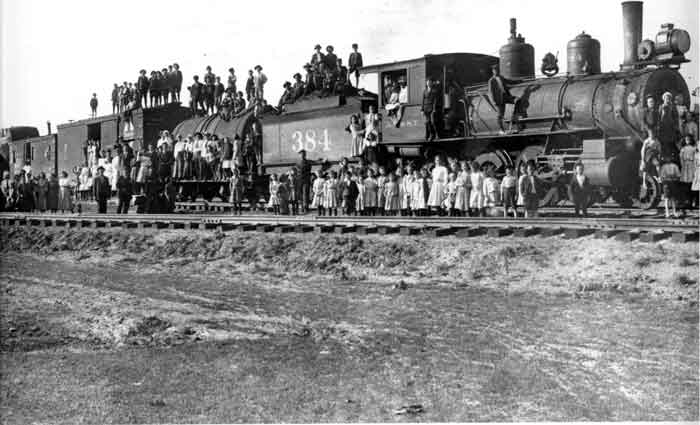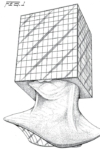 In the middle of the city of Opelousas, which is almost in the geographical center of the state of Louisiana, sits a single boxcar with a plaque alongside it. The plaque tells us that Opelousas was a destination for the Orphan Train, a train where orphans were taken from the streets of New York City and sent every which way, wherever wasn’t a city. It explains that the most charitable minds of 19th century New York society decided that the best thing to do with all their orphans was to pack them up and send them to the hinterlands, where they could be given a family, maybe some education, and a job to do. The frontier was work. All in all, between 1853 and 1929, over 100,000 children were put on trains and told to break totally with their past. The Children’s Aid Society, which organized the trains, rarely kept track of what happened to the children or what possible new names they took.
In the middle of the city of Opelousas, which is almost in the geographical center of the state of Louisiana, sits a single boxcar with a plaque alongside it. The plaque tells us that Opelousas was a destination for the Orphan Train, a train where orphans were taken from the streets of New York City and sent every which way, wherever wasn’t a city. It explains that the most charitable minds of 19th century New York society decided that the best thing to do with all their orphans was to pack them up and send them to the hinterlands, where they could be given a family, maybe some education, and a job to do. The frontier was work. All in all, between 1853 and 1929, over 100,000 children were put on trains and told to break totally with their past. The Children’s Aid Society, which organized the trains, rarely kept track of what happened to the children or what possible new names they took.
A great migration had taken place, and these Italian, Irish, and German children now found themselves under the care or employ of Swedes, Norwegians, and Cajuns. Via rail, by this proscribed track which by then reached to almost all parts of the country, the children were given their own dose of manifest destiny, the chance to leave what was to be a horrible life and have what, well, could still be a horrible life, but at least that was still uncertain. Some of these orphans became Supreme Court justices and others became ranchers or murderers or just regular, boring people, but for that moment when the country passed outside (who knows if they even cared to look), they were tabula rasa. They were, in a very 19th-century sense, American.
A hundred and fifty years later a man in middle-age appreciates this idea of American-ness, the one where very little about you matters, just that you’re there or that you came all this way. William Vollmann is concerned with the America where you get off the train and take a look around, or better yet, where you’re never too inclined to get off the rails. In Riding Toward Everywhere, his chronicle of his years of hopping freight trains for no good reason other than that it’s exciting and memorable and slows down the day, he’s fixated on the idea of the American-ness. Un-Americans, to him, are those people who ask for tickets, who ask for identification, who throw you in jail or shoot you down for standing the wrong way on the street.
“It is the security men,” Vollmann writes, “the necessary evils who make each succeeding year of my life more unfree than the one before, these are the ones whom I hate and fear.”
The standard prescription of American life is what Vollmann is rebelling against when he hops those freight cars, which either take him through the glorious mountains and plains of the West or to a desolate, hot train yard, bored so totally he stares on end at graffiti on the inside of the train car. Vollmann hates those who try to tell him his future by bashing him with the immediacy of it. They tell him that he will either be confined by the dictates of his role or they will take that choice away from him.
The prescription of an American life is what those children on the orphan train are probably hoping for — a job, some education, some family to tell them what time to go to bed. But on the train, during the voyage, both become unsubstantiated, both completely at the whim of wherever the train takes them. Stability takes a back seat to open-ended promise.
“When you gamble on a freight train,” Vollmann writes, “It is so much like life: you don’t know the future.”
More than 50% of the town of Opelousas lives below the poverty line. It’s probable, just by dint of getting there first and being European, that the descendants of the orphan train are not among the impoverished. They might not even be around there anymore, all that remains of their passing a symbolic boxcar resting on the spot where they were once paraded in front of a crowd, sized up, inspected for disease, taken and, hopefully, welcomed.
Following Route 190 to the west, one comes across Eunice, a small town similar in make to Opelousas, but with a bustling main street, some cafes, a high-end clothing shop, and a fancy restaurant. Neighboring towns can differ greatly, but in this case the change is particularly stark. There’s no plaque to commemorate it, but Eunice was the site of a train derailment in 2000 that spilled sulfuric acid mixed with plastic and ammonium nitrate on the outskirts of the city. 3,000 people had to evacuate in a matter of hours. Union Pacific paid out $65 million in settlements to 10,000 claimants in the area. Suddenly, cafes and high end shops popped up. Two sports bars. By rail, fortune had found Eunice, spilling its largesse in the form of sulfuric acid.
But all that acid can’t be good in the long run. Their luck begets uncertainty, and while the children were fortunate enough (possibly) to be put on that train and taken off the street, what awaited them when the train finally came to its destination? Without any real record of what happened to them, they remain in the ethereal realm of a train always leaving the station, or a middle-aged man happily waiting for darkness to slip into a different train car, or a nice restaurant hundreds of feet from an environmental disaster, all briefly suspended in their motion.
This post may contain affiliate links.







